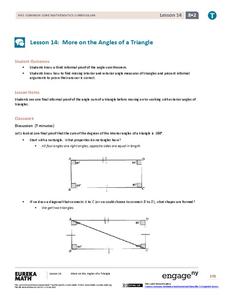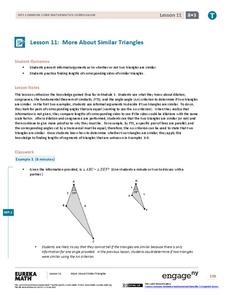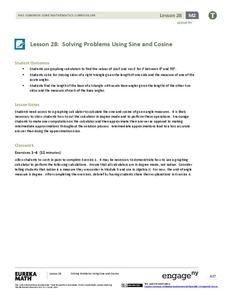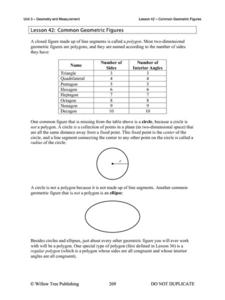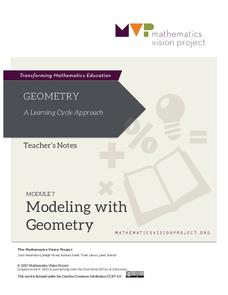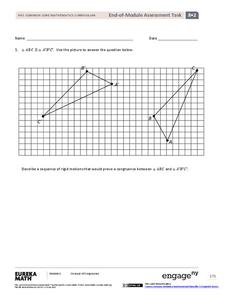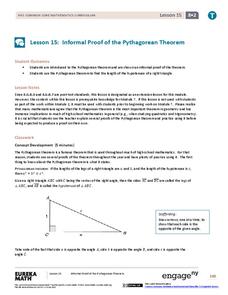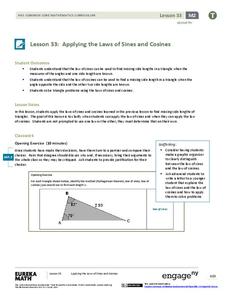McGraw Hill
Triangles
After reviewing characteristics of seven types of triangles, young geometers discover how to find the missing angle of a triangle. Then, they practice identifying triangles, find missing angles, and find missing side lengths of...
Willow Tree
Angle Sum Property of Triangles
All triangles have some things in common. Using these properties of triangles, learners find missing angle measures. Scholars use the Angle Sum Property and properties of special triangles throughout the lesson.
EngageNY
More on the Angles of a Triangle
Angles and triangles: they're all connected. Uncover the connections between angles in triangles. Scholars learn how to find both exterior and interior angle measures in triangles. The instructional activity emphasizes the vocabulary...
EngageNY
The Angle-Angle (AA) Criterion for Two Triangles to Be Similar
What do you need to prove triangles are similar? Learners answer this question through a construction exploration. Once they establish the criteria, they use the congruence and proportionality properties of similar objects to find...
EngageNY
Unknown Angles
How do you solve an equation like trigonometry? Learners apply their understanding of trigonometric ratios to find unknown angles in right triangles. They learn the meaning of arcsine, arccosine, and arctangent. Problems include...
EngageNY
More About Similar Triangles
Determine whether two triangles are similar. The lesson presents opportunities for pupils to find the criterion needed to show that two triangles are similar. Scholars use the definition of similarity to find any missing side...
EngageNY
Special Relationships Within Right Triangles—Dividing into Two Similar Sub-Triangles
Why are right triangles so special? Pupils begin their study of right triangles by examining similar right triangles. Verifying through proofs, scholars recognize the three similar right triangles formed by drawing the altitude. Once...
EngageNY
The Definition of Sine, Cosine, and Tangent
Introduce your classes to a new world of mathematics. Pupils learn to call trigonometric ratios by their given names: sine, cosine, and tangent. They find ratios and use known ratios to discover missing sides of similar...
EngageNY
Prove the Pythagorean Theorem Using Similarity
Amaze your classes with the ability to find side lengths of triangles immediately — they'll all want to know your trick! Learners use the Pythagorean Theorem and special right triangle relationships to find missing side lengths.
EngageNY
Using Trigonometry to Find Side Lengths of an Acute Triangle
Not all triangles are right! Pupils learn to tackle non-right triangles using the Law of Sines and Law of Cosines. After using the two laws, they then apply them to word problems.
Willow Tree
Ratios and Proportions with Congruent and Similar Polygons
Investigate how similar and congruent figures compare. Learners understand congruent figures have congruent sides and angles, but similar figures only have congruent angles — their sides are proportional. After learning the...
EngageNY
Solving Problems Using Sine and Cosine
Concepts are only valuable if they are applicable. An informative resource uses concepts developed in lessons 26 and 27 in a 36-part series. Scholars write equations and solve for missing side lengths for given right triangles....
Willow Tree
Common Geometric Figures
Geometry could be called the study of figures. An overview of the figures found in a typical geometry course contains a study of different triangles, quadrilaterals, and regular polygons.
Willow Tree
The Pythagorean Theorem
There isn't a more popular geometry formula than the Pythagorean Theorem! Learners understand the special side relationships in a right triangle. They use the Pythagorean Theorem to find missing sides and to solve problems. They begin...
Mathematics Vision Project
Module 5: Modeling with Geometry
Solids come in many shapes and sizes. Using geometry, scholars create two-dimensional cross-sections of various three-dimensional objects. They develop the lesson further by finding the volume of solids. The module then shifts...
Mathematics Vision Project
Module 7: Modeling with Geometry
Model good modeling practices. Young mathematicians first learn about cross sections and solids of revolution. They then turn their attention to special right triangles and to the Laws of Sine and Cosine.
EngageNY
End-of-Module Assessment Task - Grade 8 Mathematics (Module 2)
Can your classes apply the knowledge they have learned? Use this performance task to find out! Individuals use transformations to explain congruence and angle relationships within parallel lines to find missing values. They show what...
Mt. San Antonio Collage
Properties of a Parallelogram
More than just a worksheet, the resource provides a thorough guide to navigate through the land of parallelograms. Filled with definitions and theorems, the resource supports learners through problems such as proofs and finding missing...
EngageNY
Informal Proof of the Pythagorean Theorem
Prove the Pythagorean Theorem using multiple informal proofs. Scholars first develop an understanding of the origins of the Pythagorean Theorem through proofs. They round out the lesson by using the theorem to find missing side lengths...
Savvas Learning
Saxon Math 5/4
You'll never have to search for another worksheet again after downloading this extensive collection of Saxon math materials. With over 600 pages of example problems and skills practice exercises, this is a must-have resource...
EngageNY
Applying the Laws of Sines and Cosines
Breaking the law in math doesn't get you jail time, but it does get you a wrong answer! After developing the Law of Sines and Cosines in lesson 33 of 36, the resource asks learners to apply the laws to different situations. Pupils must...
Mathematics Vision Project
Module 6: Congruence, Construction, and Proof
Trace the links between a variety of math concepts in this far-reaching unit. Ideas that seem very different on the outset (like the distance formula and rigid transformations) come together in very natural and logical ways. This...


